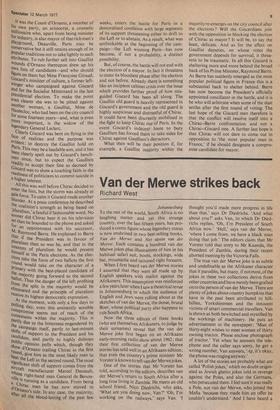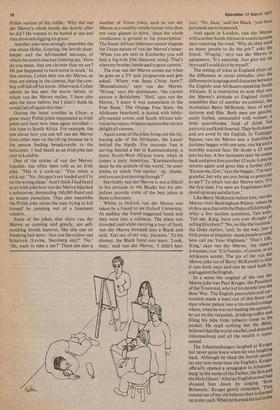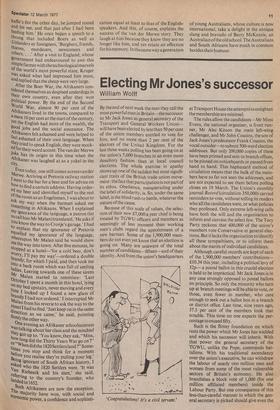Van der Merwe strikes back
Richard West
Johannesburg To the rest of the world, South Africa is no laughing matter and yet this strange country, over the last fifteen years, has produced a comic figure whose legendary status is now enshrined in two best-selling books, Van der Merwe and Not again van der Merwe. Each contains a hundred van der Merwe jokes plus illustrations of him in his habitual safari suit, boots, stockings, wide hat, moustache and tattooed right forearm.
When I first heard van der Merwe stories I assumed that they were all made up by English speakers with malice against the Afrikaners. This assumption was reinforced a few years later when I saw a theatrical revue in Johannesburg in which the audience of English and Jews were rolling about at the sketches of van der Merwe, the dense, brutal Boer, whose political party also happens to rule South Africa.
Now the three editors of these books (who are themselves Afrikaners, to judge by their surnames) reveal that the van der Merwe joke first began on an Afrikaans early-morning radio show about 1962; that their first collection of van der Merwe stories has sold well in an Afrikaans edition; that even the country's prime minister Mr Vorster is known to tell van der Merwe jokes.
One of the stories that Mr Vorster has told, according to the editors, describes van der Merwe's return to South Africa after a long time living in Zambia. He meets an old school friend, Nico Diedrichs, who asks, 'What are you doing now, Van ?"Oh, I'm working on the railways,' says Van. `I thought you'd made more progress in life than that,' says Dr Diedrichs. 'And what about you ?' asks Van, to which Dr Diedrichs replies, 'Oh, I'm President of South Africa now.' Hell,' says van der Merwe, 'where I come from, we have a black man doing that job.' The editors claim that Mr Vorster told that story to Mr Kaunda, the President of Zambia, during their recent aborted meeting by the Victoria Falls.
The true van der Merwe joke is as subtle and undefinable as the Afrikaner character that it parodies, but many, if not most, of the jokes in these two collections derive from ot her countries and have merely been grafted on to the person of van der Merwe. There are plenty of jokes about country bumpkins that have in the past been attributed to hillbillies, Yorkshiremen and the innocent victims of smart commercial travellers. Van is shown as both bewitched and mystified by the workings of machinery. He puts an advertisement in the newspaper : 'Man of thirty-eight wishes to meet woman of thirty owning tractor. Please enclose photograph of tractor.' Yet when he answers the telephone and the caller says sorry, he got a wrong number, Van answers, 'lig, it's okay, the phone was ringing anyway.'
A lot of the stories are probably what are called 'Polish jokes,' which no doubt originated as Jewish ghetto jokes told in revenge against the Poles, and also the Germans, who persecuted them. I feel sure it was really a Pole, not van der Merwe, who joined the Mafia 'because they made him an offer he couldn't understand.' And I have heard a Polish variant of the riddle: 'Why did van der Merwe's whole family die shortly after he did? He wanted to be buried at sea and they drowned digging his grave.'
Another joke here strongly resembles the one about Hitler, Goering, the Jewish shopkeeper and the left-handed tea-cups, of which the punch-line has Goering say, 'How do you mean, they are cleverer than we are? He just happened to have some in stock.' In this version, Cohen bets van der Merwe, as they are sitting in the cinema, that the cowboy will fall off his horse. Afterwards Cohen admits he has seen the movie before, to which van der Merwe replies, 'I have also seen the show before, but I didn't think he would fall off again this time.'
During the latest troubles in Ulster, a great many Polish jokes reappeared as Irish jokes and have now once again travelled— this time to South Africa. For example, the one about how you can tell van der Merwe from other men on the oil rig because he is the person feeding breadcrumbs to the helicopter, I had heard as an Irish joke last year in London.
One of the stories of van der Merwe, hijacker, has often been told as an Irish joke. 'This is a cock-up.' You mean a stick-up."No, this gun's not loaded and I'm on the wrong plane.' And! think I had heard as an Irish joke how van der Merwe hijacked a submarine, demanding 100,000 Rand and an escape parachute. That also resembles the Polish joke about the man trying to kill himself by jumping out of a basement window.
Some of the jokes, that show van der Merwe as cunning and greedy, are selfmocking Jewish humour, like this one on breaking bad news: 'Are you the widow van Schalwyk (Levine, Sternberg etc)?' No.' `Ah, want to take a bet?' There are also a number of Texan jokes, such as van der Merwe as a wealthy mealie farmer who does not wear glasses to drive, 'since the whole windscreen is ground to his prescription.' The South African reference cannot disguise the Texan nature of van der Merwe's boast: 'When you are next in Kimberley you will find a big hole [the diamond mine]. That's where my brother Jannie used to grow carrots.'
The true van der Merwe comes out when he goes on a TV quiz programme and gets asked, 'Where was Jesus Christ born?' 'Bloemfontein,' says van der Merwe. 'Wrong,' says the quizmaster, 'the correct answer is Bethlehem.' Hell,' says van der Merwe, 'I knew it was somewhere in the Free State.' The Orange Free State, the Afrikaner heartland, is dotted with biblically-named towns, and South African television has many religious quizzes that do not delight all viewers.
Again some of the jokes bring out the sly, teasing side of the Afrikaner, the Laurel behind the Hardy. For instance Van is serving behind a bar in Keetmanshoop, a dusty South-West African town, when in comes a testy American. 'Keetmanshoop must be the asshole of the world,' he complains, to which Van replies: `Ag, shame, and you are just passing through?'
Inevitably van der Merwe is not a liberal in his attitude to the Blacks but his prejudices provide some of the best jokes in these collections: Whilst in Oxford, van der Merwe was taken by a friend to see Oxford University. At midday the friend suggested lunch and they went into a cafeteria. The place was crowded and while carrying a tray of food, van der Merwe bumped into a Black and said, 'Get out of my way, piccanin.' To his dismay, the Black burst into tears. 'Look, man,' said van der Merwe, 'I didn't hurt you."No, baas,' said the Black, 'you have just made me so homesick.'
And again in London, van der Merwe with another South African is watchingsonae men repairing the road. 'Why do they need so many people to do the job?' asks the friend. `Wragtig,' says van der Merwe in agreement, 'It's amazing. Just give me six boys and I could do it by myself.'
The setting of jokes in England plays up the difference in racial attitudes, also the difference in language and character between the Englishand Afrikaans-speaking South Africans. It is instructive to note that van der Merwe's attitude to England closely resembles that of another ex-colonial, the Australian Barry McKenzie, hero of strip cartoon and film. Both men are gauche, easily fooled, unsucessful with women, a little quarrelsome, fond of drink but patriotic and kind-hearted. They both detest and are awed by the English. In Trafalgar Square, van der Merwe sees a hunchback cockney beggar with one arm, one leg and a horribly scarred face. He drops a £5 note into his hat. A few moments later he comes back and gives him another £5 note. Later he returns again and gives him a further £10. 'Excuse me, Guy,' says the beggar,' I'm very grateful, but why are you being so generous to me?' To which van der Merwe says, It s the first time I've seen an Engelsman dolldered up to my satisfaction.' Like Barry McKenzie before him, van der Merwe visits Buckingham Palace, where he strikes up a chat with the Duke of Edin burgh. After a few tactless questions, Van asks: 'Tell me, King, have you ever thought of, selling this place ?"No, we like the location, the Duke replies; 'and, by the way, just !, little point of etiquette: most people arounu here call me Your Highness.' That's 01C, King,' says van der Merwe, 'my name s Johannes, too.' It is funnier, of course, in an Afrikaans accent. The joy of the van der Merwe joke (as of Barry McKenzie) is that it cuts both ways and can be used both bY and against the English. In a sense the original of the van der' Merwe joke was Paul Kruger, the President of the Transvaal, who led his people into the Boer War. The English journalists and cartoonists made a meal out of this fierce old man whose palace was a tin-roofed cottage where, when he was not feeding the animals, he sat on the verandah, drinking coffee an filling his pipe from tobacco loose in hts pocket. He read nothing but the Bible, believed that the world was flat, and detested sJeonhtaendnesburg and all the wealth it repre The Johannesburgers laughed at Kruger but never quite knew when he was laughing back. Although he liked the Jewish People (at any rate more than the English), rugl' officially opened a synagogue in Johannes: burg 'in the name of the Father, the Sonand. the Holy Ghost.' After an English crowd had shouted him down by singing `Rule Britannia, Kruger gently remarked, 'T.he3r. remind me of my old baboon that is chained up in my yard. When he burned his tail in the kaffir's fire the other day, he jumped round and bit me, and that just after I had been feeding him.' He once began a speech to a throng that included Boers as well as Clitlanders or foreigners, 'Burghers, friends, thieves, murdeiers, newcomers and Others . . . After a visit to England, whose government had endeavoured to awe this simple farmer with the technol ogica I marvels Of the world's most powerful state, Kruger was asked what had impressed him most, and replied that the sheep were very large.
After the Boer War, the Afrikaners considered themselves as despised underdogs in their own country, even after they won Political power. By the end of the Second World War, almost 90 per cent of the Afrikaners lived in the towns, compared to a mere 10 per cent at the start of the century, Yet the English had most of the wealth, the good jobs and the social assurance. The Afrikaners felt ashamed and were helped to feel ashamed of their own language. When they tried to speak English, they were mocked for their weird accent. The van der Merwe joke has its origin in this time when the
Afrikaner was laughed at as a yokel in the City.
Even today, one still comes across van der Merwe. Arriving at Pretoria railway station I went to the bar for a beer and for advice on
how to find a certain address. Having ordered my beer and identified myself to the rest of the room as an Engelsman, I was about to ask my way when the barman asked me something in Afrikaans. When I explained My ignorance of the language, a patron (let us call him Mr Malan) translated, 'He asks if You know the way to Cronje's garage.' I had t° explain that my ignorance of Pretoria equalled my ignorance of the language, whereupon Mr Malan said he would show me the way into town. After five minutes, he stopped at a hotel—Tor a cold beer, don't worry, I'll pay my way'—ordered a double .brandy, for which I paid, and then took me Into a back room which was full of smiling „aches. Leering towards one of these sirens 'It' Malan started to reminisce: 'Last October I spent a month in this hotel, lying (3n my bed upstairs, never moving and every ti_inte I looked up I found a new glass of 1„randy I had not ordered.' I interrupted Mr malan from his reverie to ask the way to the street I had to find. 'Just keep on in the same direction as we came,' he said, pointing nrrolY the other way.
One evening an Afrikaner schoolmistress was talking about her class and the mischief they got UP to. 'You know, they ask, "Miss, "OW long did the Thirty Years War go on?
tc"r When did the 1820 Settlers land?" Some hites You stop and think for a moment 'etore you realise they're pulling your leg., 8eing ignorant of South African history, I asked who the 1820 Settlers were. 'It was van Riebeeck and his men,' she said, referring to the country's founder, who landed in 1652. Such Afrikaners are now the exception. he majority have won, with social and economic power, a confidence and sophisti
cation equal at least to that of the Englishspeakers. And this, of course, explains the success of the van der Merwe story. They laugh at him because they know they are no longer like him, and yet retain an affection for his memory. In the same Way a generation
of young Australians, whose culture is now international, take a delight in the antique slang and bravado of Barry McKenzie, an Australian of the old school. The Australians and South Africans have much in common besides their humour.








































 Previous page
Previous page